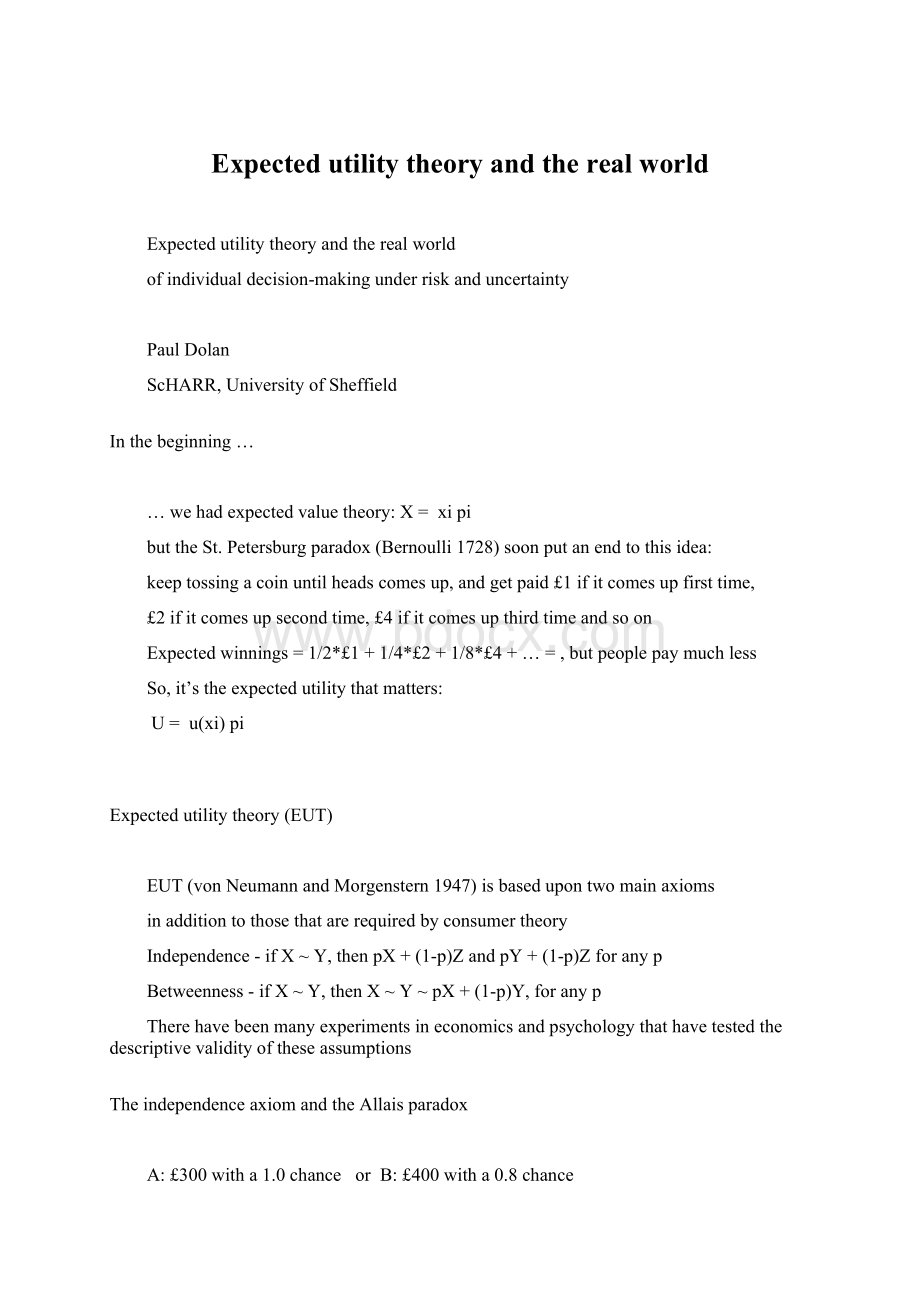Expected utility theory and the real worldWord文档下载推荐.docx
《Expected utility theory and the real worldWord文档下载推荐.docx》由会员分享,可在线阅读,更多相关《Expected utility theory and the real worldWord文档下载推荐.docx(5页珍藏版)》请在冰豆网上搜索。

Expectedwinnings=1/2*£
1+1/4*£
2+1/8*£
4+…=,butpeoplepaymuchless
So,it’stheexpectedutilitythatmatters:
U=u(xi)pi
Expectedutilitytheory(EUT)
EUT(vonNeumannandMorgenstern1947)isbasedupontwomainaxioms
inadditiontothosethatarerequiredbyconsumertheory
Independence-ifX~Y,thenpX+(1-p)ZandpY+(1-p)Zforanyp
Betweenness-ifX~Y,thenX~Y~pX+(1-p)Y,foranyp
Therehavebeenmanyexperimentsineconomicsandpsychologythathavetestedthedescriptivevalidityoftheseassumptions
TheindependenceaxiomandtheAllaisparadox
A:
£
300witha1.0chanceorB:
400witha0.8chance
C:
300witha0.25chanceorD:
400witha0.2chance
AclearmajorityofpeoplechooseAandD
butthisviolatesindependencesinceCandDare'
scaled-down'
versionsofAandB
i.e.theyarebothscaleddownbyafactorof0.25
SomealternativestoEUT
TheAllaisparadoxcanbeexplainedbyaweakenedversionofindependence:
ifX~Y,then,foreveryZandp,thereissomeqforwhichpX+(1-p)Z~qY+(1-q)Z
RegretTheory(LoomesandSugden1982)-
expectedutilitiesaremodifiedbyfeelingsofregretifthingsturnoutworsethantheywouldhavedoneundertheotheroption,orbyrejoicingifthingsturnoutbetter
Theregretfunction,ij,representsthedifferencebetweentheutilityfromxiandtheutilitythatwouldhavebeenderivedfromxj.Thisfunctionhastwokeyproperties:
ij=-ij
x3x1>
x3x2andx3x1>
x2x1wherex3>
x2>
x1
ItcanbeshownthattheAllaisparadoxrequiresthat:
x3x2+x2x1
EUwithrankdependentprobabilityweights(Quiggin1982)-
assumesthatprobabilitiesareweightedaccordingtotherankorderoftheoutcomesEUwillnotholdunlesstheprobabilitytransformationfunctionf(p)isp.
Aconcavef(.)meansthatifX~Y,thenpX+(1-p)Y<
X
i.e.peopledon’tlikeaprobabilitymixtureofXandYwhenX~Y
That'
srisk-whataboutuncertainty?
Knight(1921)madeadistinctionbetween:
Risk–probabilitiescanbeassignedtodifferentoutcomes,and
Uncertainty–noprobabilitiescanbeattachedtopossibleoutcomes
Modelshavebeenproposedwhichimplythatalluncertaintiescanbereducedtorisks
Savage(1954)arguesthatwecaninfersubjectiveprobabilitiesfromactualchoices
e.g.gamblingdecisionsallowustoinfera"
qualitativeprobabilityrelationship"
SubjectiveEUTandSavage'
ssure-thingprinciple
PostulateIIstatesthatthechoicebetweentwoactionsisunaffectedbythepay-offsinaconstantcolumn
ABC
1
a
b
B
2
3
C
4
If1>
2above,then3>
4,whenaandbareunchangedandCtakesanyvalue
TheEllsbergParadox–Experiment2
Anurncontains30redballsand60blackandyellowballsinunknownproportion
Q1.Doyouprefertobetonred(A)orblack(B)?
Q2.Doyouprefertobetonredandyellow(C)orblackandyellow(D)?
MostpeoplechooseAandDbutthisisinconsistentwithSavage'
redblackyellow
A
100
D
Ambiguity
Ellsberg(1961)explainstheseviolationsofthesure-thingprincipleintermsofpeople'
sdislikeforambiguity,orambiguityaversion
Ambiguitycanbedefinedasuncertaintyaboutprobabilitycreatedbymissinginformationthatisrelevantandcouldbeknown-A>
BbecausetheproportionofredballsisknownandD>
Cbecausetheproportionofblackandyellowballsisknown
Ellsbergarguesthatdecisionsaremadeonthebasisof3factors:
1)therelativedesirabilityofthepossiblepay-offs
2)therelativelikelihoodoftheeventsaffectingthem
3)thenatureofone'
sinformationconcerningtherelativelikelihoodofevents
Thejudgementoftheambiguityofone'
sinformationcannotbecharacterisedasriskasrequiredbythepostulatesofSavageandothers-andthereforeliesoutsideofSEUT
Thepreferencereversalphenomenon(PRP)
Conventionaltheorysuggeststhatthevaluationof,andchoiceover,differentalternativesshouldproducethesameordering
e.g.ifaskedtovaluetwolotterytickets,AandB,andthentochoosebetweenthem,thosewhogivethegreatestvaluetoA(B)shouldchooseA(B)
Butexperimentalevidencesuggeststhatthereisasystematictendencyfortherankingrevealedbyvaluationtaskstodifferfromthatrevealedbychoicetasks
PRP-anexample
P-bet:
0.6chanceofwinning£
22$-bet:
0.3chanceofwinning£
40
0.4chanceofwinning£
00.7chanceofwinning£
Q1.1WhatistheminimumamountyouwouldacceptfortheP-bet?
Q1.2Whatistheminimumamountyouwouldacceptforthe$-bet?
Q2Whichgamblewouldyouprefertoplayout?
Overwhelminglypeopleplacethehighestvalueonthe$-betyetchoosetheP-bet
i.e.thereisasystematictendencyforpeopletoplacethehighestvalueonthebetwiththegreaterpossiblegainandtochoosethebetwithgreaterprobabilityofwinning
ExplanationsofPRP
Economists-
Ifrespondentshaveanunderlyingsetofpreferences,thenthereisarealconcernthatthePRPrepresentsaviolationoftransitivity:
if$-bet=r$>
<
C>
rP=P-bet
therefore,ifr$>
rPandP>
$,thenpreferencesareintransitive
RegretTheorycanaccountfortheintransitivepreferencesfoundinexperiments
Psychologists-
Peopleusedifferentcognitiveprocessesinvaluationandchoicetasks
Whenvaluingthegambles,respondentssettheamountiftheywinasananchorandthenadjustdownwardstotakeaccountofthefactthattheymaynotwin
Buttheydonotadjustdownsufficientlyandhenceplaceahighervalueonthe$-betWhenchoosingbetweenthebets,theypaymoreattentiontotherelativechancesofwinningandhencechoosetheP-bet
Conclusions
Thedescriptivevalidityof(S)EUThasbeencalledintoquestiontimeandtimeagainfromexperimentsthatinvolverealmonetarypay-offstorealpeopleintherealworld
Butdoesthismatter?